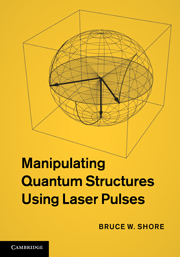Book contents
- Frontmatter
- Contents
- Preface
- Acknowledgments
- 1 Introduction
- 2 Atoms as structured particles
- 3 Radiation
- 4 The laser–atom interaction
- 5 Picturing quantum structure and changes
- 6 Incoherence: Rate equations
- 7 Coherence: The Schrödinger equation
- 8 Two-state coherent excitation
- 9 Weak pulse: Perturbation theory
- 10 The vector model
- 11 Sequential pulses
- 12 Degeneracy
- 13 Three states
- 14 Raman processes
- 15 Multilevel excitation
- 16 Averages and the statistical matrix (density matrix)
- 17 Systems with parts
- 18 Preparing superpositions
- 19 Measuring superpositions
- 20 Overall phase; interferometry and cyclic dynamics
- 21 Atoms affecting fields
- 22 Atoms in cavities
- 23 Control and optimization
- Appendix A Angular momentum
- Appendix B The multipole interaction
- Appendix C Classical radiation
- Appendix D Quantized radiation
- Appendix E Adiabatic states
- Appendix F Dark states; the Morris–Shore transformation
- Appendix G Near-periodic excitation; Floquet theory
- Appendix H Transitions; spectroscopic parameters
- References
- Index
21 - Atoms affecting fields
Published online by Cambridge University Press: 07 October 2011
- Frontmatter
- Contents
- Preface
- Acknowledgments
- 1 Introduction
- 2 Atoms as structured particles
- 3 Radiation
- 4 The laser–atom interaction
- 5 Picturing quantum structure and changes
- 6 Incoherence: Rate equations
- 7 Coherence: The Schrödinger equation
- 8 Two-state coherent excitation
- 9 Weak pulse: Perturbation theory
- 10 The vector model
- 11 Sequential pulses
- 12 Degeneracy
- 13 Three states
- 14 Raman processes
- 15 Multilevel excitation
- 16 Averages and the statistical matrix (density matrix)
- 17 Systems with parts
- 18 Preparing superpositions
- 19 Measuring superpositions
- 20 Overall phase; interferometry and cyclic dynamics
- 21 Atoms affecting fields
- 22 Atoms in cavities
- 23 Control and optimization
- Appendix A Angular momentum
- Appendix B The multipole interaction
- Appendix C Classical radiation
- Appendix D Quantized radiation
- Appendix E Adiabatic states
- Appendix F Dark states; the Morris–Shore transformation
- Appendix G Near-periodic excitation; Floquet theory
- Appendix H Transitions; spectroscopic parameters
- References
- Index
Summary
The major portion of this monograph discusses how given pulses of laser radiation affect individual atoms. This chapter inverts that relationship, describing how the matter alters the fields. Those field changes provide quantitative measures of the quantum-state changes produced in the atoms. Their description therefore is an adjunct to Chap. 19.
Basically the incident radiation produces excitation which, in turn, alters the various multipole moments of the atoms. When viewed as a macroscopic sample of matter, such changes alter the electric polarization field P and the magnetization field M of the matter through which the radiation must pass. The Maxwell equations, see App. C.1, provide the needed description of how the P and M fields alter the electric and magnetic fields E and B. The combination of the Maxwell equations for the fields and the Schrödinger, Bloch, or Liouville equations for the atoms provide the tools needed to construct a self-consistent description of radiation passing through matter – atoms responding to a pulsed field and traveling waves being modified by the resulting atomic changes [All87; Ale92; Muk99; Die06; Vit01a]. The present chapter, drawing on [Sho90, Chap. 12] and App. C, discusses this theory.
Incoherent radiation passing through matter typically undergoes exponential attenuation in accord with eqn. (6.9). A measure of the incremental change of intensity in distance L by absorption coefficient κ is the optical depth κL. This parameter appears in rateequation treatments of incoherent light attenuation.
Information
- Type
- Chapter
- Information
- Manipulating Quantum Structures Using Laser Pulses , pp. 387 - 418Publisher: Cambridge University PressPrint publication year: 2011
